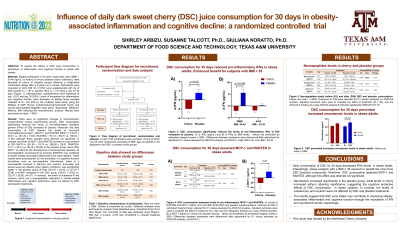Back

Objectives: To assess the effects of DSC juice consumption in biomarkers of inflammation and cognitive function in adults with obesity
Methods: Eligible participants ( >18 years, body-mass index (BMI) = 30-40 kg/m2, no history of chronic disease and/or antibiotics), were allocated to cherry or placebo groups following a single-blind randomized design after a 2-week run-in period. Participants were instructed to drink 200 mL of DSC juice supplemented with 3g of DSC powder (n = 19) or placebo drink (n = 21) twice a day for 4 weeks. Levels of biomarkers for inflammation and cognitive function were assessed on fasting blood samples collected at week 0 and week 4 by the multiplex bead assay using the Human Cytokine/Chemokine/Growth Factor and Human Neuropeptide Magnetic bead panel, respectively, (Millipore; Billerica, MA) following the manufacturers’ protocol. Results were expressed as mean ± SEM.
Results: Results showed that 4 weeks of DSC supplementation lowered the levels of monocyte chemoattractant protein 1 (MCP-1) and RANTES (MCP-1= 316.07 ± 26.81 vs. 281.45 ± 19.93, RANTES= 175.13 ± 56.91 vs. 100.54 ± 17.92), although these changes were not significant. In contrast, the levels of MCP-1 and RANTES showed no improvement in week 4 (MCP-1= 261.04 ± 18.75 vs. 298.99 ± 28.91, RANTES= 101.7 ± 28.14 vs. 96.79 ± 20.59) in the placebo group. Since MCP-1 is critical for the development of cardiovascular diseases, its downregulation accompanied by lowering RANTES may contribute to lessen obesity-associated inflammation and heart disease. These results were accompanied by improvements in cognitive impairment observed in DSC group. The levels of neurotensin which is altered in obesity was significantly higher in the placebo group at week 4 (103.70 ± 24.29 vs 127.57 ± 30.96, p=0.006) compared to the DSC group (105.81 ± 25.85 vs. 122.41 ± 28.05, p=0.07). Likewise, the levels of substance-P which promotes an inflammatory environment in obesity, was significantly elevated in placebo group (21.36 ± 7.29 vs. 27.59 ± 7.65, p=0.04) when compared to DSC group (21.89 ± 7.53 vs. 28.65 ± 4.32, p=0.52).
Conclusions: These findings suggest that consumption of DSC juice over 4 weeks may decrease obesity-associated low-grade inflammation and cognitive decline.
Funding Sources: Northwest Cherry Growers
Food Science and Nutrition
(PO14-06-22) Influence of Daily Dark Sweet Cherry (DSC) Juice Consumption for 4 Weeks in Obesity-Associated Inflammation and Cognitive Decline: A Randomized Controlled Trial


Shirley Arbizu, MS
– Ph.D. Candidate, Texas A&M University, College Station, Texas, United States- ST
Susanne U. Talcott
– Texas A&M university - GN
Giuliana Noratto, Ph.D.
– Texas A&M University
Presenting Author(s)
Co-Author(s)
Disclosure(s):
Shirley Arbizu, MS: No relevant financial relationship(s) with ineligible companies to disclose.
Objectives: To assess the effects of DSC juice consumption in biomarkers of inflammation and cognitive function in adults with obesity
Methods: Eligible participants ( >18 years, body-mass index (BMI) = 30-40 kg/m2, no history of chronic disease and/or antibiotics), were allocated to cherry or placebo groups following a single-blind randomized design after a 2-week run-in period. Participants were instructed to drink 200 mL of DSC juice supplemented with 3g of DSC powder (n = 19) or placebo drink (n = 21) twice a day for 4 weeks. Levels of biomarkers for inflammation and cognitive function were assessed on fasting blood samples collected at week 0 and week 4 by the multiplex bead assay using the Human Cytokine/Chemokine/Growth Factor and Human Neuropeptide Magnetic bead panel, respectively, (Millipore; Billerica, MA) following the manufacturers’ protocol. Results were expressed as mean ± SEM.
Results: Results showed that 4 weeks of DSC supplementation lowered the levels of monocyte chemoattractant protein 1 (MCP-1) and RANTES (MCP-1= 316.07 ± 26.81 vs. 281.45 ± 19.93, RANTES= 175.13 ± 56.91 vs. 100.54 ± 17.92), although these changes were not significant. In contrast, the levels of MCP-1 and RANTES showed no improvement in week 4 (MCP-1= 261.04 ± 18.75 vs. 298.99 ± 28.91, RANTES= 101.7 ± 28.14 vs. 96.79 ± 20.59) in the placebo group. Since MCP-1 is critical for the development of cardiovascular diseases, its downregulation accompanied by lowering RANTES may contribute to lessen obesity-associated inflammation and heart disease. These results were accompanied by improvements in cognitive impairment observed in DSC group. The levels of neurotensin which is altered in obesity was significantly higher in the placebo group at week 4 (103.70 ± 24.29 vs 127.57 ± 30.96, p=0.006) compared to the DSC group (105.81 ± 25.85 vs. 122.41 ± 28.05, p=0.07). Likewise, the levels of substance-P which promotes an inflammatory environment in obesity, was significantly elevated in placebo group (21.36 ± 7.29 vs. 27.59 ± 7.65, p=0.04) when compared to DSC group (21.89 ± 7.53 vs. 28.65 ± 4.32, p=0.52).
Conclusions: These findings suggest that consumption of DSC juice over 4 weeks may decrease obesity-associated low-grade inflammation and cognitive decline.
Funding Sources: Northwest Cherry Growers

.png)
